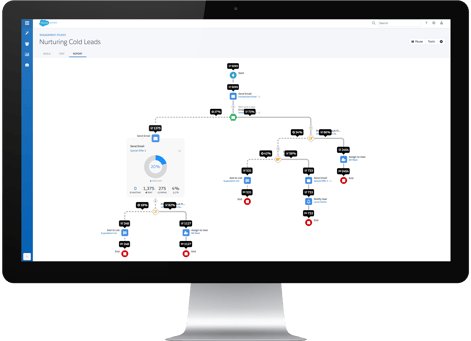
When Salesforce acquired Pardot in 2013, many digital marketers assumed that Pardot would be integrated and assimilated into Salesforce Marketing Cloud, adding to their extensive marketing services and functionality. However, this was not the case, and to this day Pardot is a separate offering while still falling under the Salesforce banner.
This may seem baffling to some marketers unfamiliar with the tools. On the surface, both Pardot and Salesforce Marketing Cloud offer the same service and opportunities. They both currently have similar review scores and client satisfaction scores at 97% and 99% respectively, and even their own descriptions seem identical.
What's the difference between Pardot and Marketing Cloud?
Pardot is described as “B2B marketing automation by Salesforce, that offers a marketing automation solution supporting the needs of B2B organizations of every size” that helps companies “Exceed revenue goals, achieve sales & marketing team alignment and gain efficient use of existing resources”. While Salesforce Marketing Cloud is positioned as a platform to “Create 1-to-1 customer journeys across email, mobile, ads, and the web. Connect your marketing across commerce, sales, service, and every customer touchpoint”.
To make matters even more confusing, both Pardot and Salesforce Marketing Cloud feed into the Salesforce Sales Cloud!
If your head is feeling a bit cloudy right now, I don’t blame you. That’s why we’ve created this handy blog post to help you tell the difference between the two so that you don’t get caught up in a digital storm of confusion.
What is Pardot?
First, it’s a good idea to briefly cover what Pardot and Salesforce Marketing Cloud are - but if you know your stuff and just want to get to the differences, feel free to click here and get there pronto!
Founded in 2006, Pardot is a marketing automation platform that allows you to identify, nurture and score your leads according to how likely they are to buy, and how valuable they are to your business. This saves businesses and marketing agencies alike who use longer sales cycles, as it automates monotonous yet important steps in the nurturing process.
What is Salesforce Marketing Cloud?
Salesforce Marketing Cloud is also an email marketing and automation platform that incorporates integrated solutions across different platforms, including social media, mobile, email, website advertising and more. Salesforce Marketing Cloud includes analytics and event-driven triggers that initiate marketing actions.
Essentially, Salesforce Marketing Cloud incorporates tools that work together across diverse marketing avenues. This includes marketing automation as well as social media marketing tools, website marketing tools and email marketing tools.
The main differences between the two
Upon reviewing the two definitions above, you may be tempted to believe that Pardot is the simpler solution to Salesforce Marketing Cloud, which is geared towards powerhouse marketing departments and top-tier agencies, however, this is not necessarily the case.
Pardot: a B2B specialist
At its core, Pardot was built to focus on B2B clients and their specific needs in mind. As a marketing automation tool primarily, it is specialised in scheduled email campaigns, lead nurturing, and keeping the company using it fresh in the collective mind of the businesses they are marketing to.
Such a company will rarely need to perform SMS-based marketing campaigns and has more simplified needs for social media marketing and website integrations. These companies will benefit from the lower cost of Pardot compared to Marketing Cloud as well as the shorter amount of admin training required. However, Pardot has only limited integration with Salesforce and no integration with external data sources.
On the other hand, Pardot is designed more with marketers in mind. It provides simple tools that allow marketers to create emails, forms, landing pages and automation without the need to involve developers. It also provides detailed contact analytics that enables marketers to understand more about the intent of individual buyers.
In other words, if you do not need the additional features that Marketing Cloud provides, such as mobile, detailed website marketing and social media, you should stick with Pardot to save money and training time.
Salesforce Marketing Cloud: all the bells and whistles needed for B2C and advanced B2B
While Marketing Cloud may be more expensive and demand more training, the additional features and capabilities it brings with it will reap rewards for larger enterprises.
A typical B2C company would need large scale integrated marketing tools to address each of their consumers. They would need transactional and triggered email services, and may well benefit from reaching consumers on their mobiles.
In addition to this, a larger company using Salesforce Marketing Cloud will find advanced web development tools and integration well-suited for the many profiles that visit their websites each day.
However, it is no new concept that B2B is shifting to mirror the B2C marketplace. With more and more B2B marketing actions occurring online, more companies are now taking the leap to integrate the Salesforce Marketing cloud into their B2B marketing efforts to profit from 360° marketing communications.
Even though SFMC hasn’t been designed for B2B lead management, there’s no need for in-house development capabilities to develop essential functionalities such as lead scoring or website tracking. Looking at Salesforce ISV partners such as SalesWings, you can make lead management and lead prioritization a native function of SFMC without writing any code.
It is important to note that an investment in the Marketing cloud will result in higher costs due to the additional features. The customer will spend more capital on longer training and skills in order to fully take advantage of the 360° view Marketing Cloud has to offer.
In Summary…
Pardot
Pros
- Modest price
- Easier to get up and running
- B2B focus
Cons
- Limited analytics compared to Cloud
- Lacks social, mobile and other marketing-specific tools
- Limited external integration
Salesforce Marketing Cloud
Pros
- A full package of marketing tools from mobile to web
- B2C focus
- Full analytics and integrated campaigns
Cons
- Expensive
- More complex than Pardot
Pardot and Marketing Cloud Experts
This post may help with a simple overview of which platform is better for you and what the difference between the two is, however, in the real world things may get complicated and not every company simply strictly falls into the B2B or B2C category.
Demodia provides digital marketing consulting and coaching that enables companies around the world to deliver better digital marketing campaigns. Demodia can help you work with Pardot, Salesforce Marketing Cloud or any digital marketing service you have.



